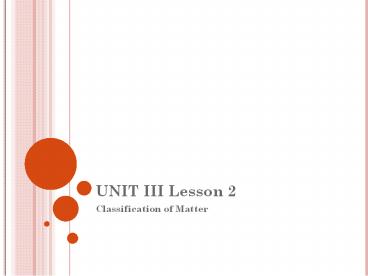UNIT III Lesson 2 PowerPoint PPT Presentation
1 / 20
Title: UNIT III Lesson 2
1
UNIT III Lesson 2
- Classification of Matter
2
Classification of matter
3
Some definitions to know
- A system a part of the ________ being studied in
a given situation. - A phase part of a _______ which is uniform in
both composition and properties. - Phases in a particular system are
distinct____________ separated from each other by
_______________ ( sometimes we use a microscope
to see these boundaries).
4
III.3 CLASSIFICATION OF MATTER
- Atom The smallest part of an element which
retains ALL the fundamental properties of the
element - Elements - contain only one type of atom
- 1. monatomic elements consist of 1 atom only ex
Fe, Al, Cu, He - 2. polyatomic elements consist of several like
atoms - bonded together
- Ex H2 O2 Br2 F2 I2 Cl2 P4
5
III.3 CLASSIFICATION OF MATTER
- A molecule is 2 or more atoms held together
- If a molecule is made up of identical atoms, it
is called an element. - If a molecule is made up of different atoms, it
is called a compound. - Atoms are held together by electrical forces.
6
III.3 CLASSIFICATION OF MATTER
- Difference between an element and a compound?
- First, they are both molecules (2 or more atoms)
- An element is made up of the same type of atoms
- A compound is made up of different types of atoms.
7
III.3 CLASSIFICATION OF MATTER
- ION atom or molecule that possesses an
electrical charge - Sodium ion (Na )
- Chloride ion (Cl- )
- Nitrate ion or Nitrate ( NO3- )
- A particle general term to describe a small bit
of matter like atom, molecule, or ion.
8
(No Transcript)
9
More terms to classify matter
- Pure substance unchanged, uniform properties.
- Ex salt (NaCl) has a density of 2.16 g/mL and
melts at 801 C and is colourless. - It is homogenous in composition too!
- Homogenous consisting of only one phase.
- Ex air, water, a piece of iron
- Heterogeneous consisting of more than one phase.
- Ex human beings, pencil, gravel.
10
2 types of mixtures
- A mixture a system made up of 2 or more
substances, and the amounts can be
different/varied. - Ex salt dissolved in water.
- If a mixture is heterogeneous, it is called a
mechanical mixture - Ex sand, iron filings with sulphur
11
Mixture or compound video
- Iron filings and sulphur
- http//www.youtube.com/watch?vcL6I1O1YHH0
12
2 types of mixtures
- If a mixture is homogenous, it is called a
solution. - gas-in-gas ? our air (hydrogen, oxygen, nitrogen)
- gas-in-liquid ? soda, pop cans.
- liquid-in-liquid ? alcohol and water
- THEY LOOK LIKE THERE ARE ONE THING
13
Homogeneous solution Heterogeneous solution
Clear solution. Transparent and will not settle Translucent or opaque solution may settle in some cases
Solutes and solvent cannot be separated by filtration or a magnet Can be separated by filtration or a magnet
Salt water, air, alloys Smoke, milk, muddy water
14
page 50 Classifying substances scheme
15
(No Transcript)
16
(No Transcript)
17
III.3 CLASSIFICATION OF MATTER
- A solution is a homogeneous mixture of 2 or more
substances - A solvent the component in a solution that
exists in greater amounts. - A solute the component in a solution that exists
in lesser amounts
18
III.3 CLASSIFICATION OF MATTER
19
III.3 CLASSIFICATION OF MATTER
- Aqueous solutions are solutions where the
solvent is water. The subscript (aq) indicates
that a compound is in aqueous solution. - When water exists in solution, we call water
the solvent EVEN if it exists in LESSER quantity.
20
- HomeWork for Monday ( for marks )
- QUESTIONS p. 52 33 - 44

